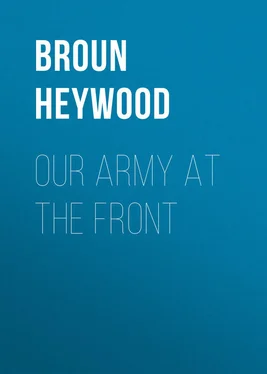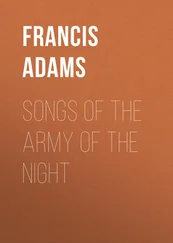Heywood Broun - Our Army at the Front
Здесь есть возможность читать онлайн «Heywood Broun - Our Army at the Front» — ознакомительный отрывок электронной книги совершенно бесплатно, а после прочтения отрывка купить полную версию. В некоторых случаях можно слушать аудио, скачать через торрент в формате fb2 и присутствует краткое содержание. Жанр: foreign_prose, foreign_antique, foreign_language, на английском языке. Описание произведения, (предисловие) а так же отзывы посетителей доступны на портале библиотеки ЛибКат.
- Название:Our Army at the Front
- Автор:
- Жанр:
- Год:неизвестен
- ISBN:нет данных
- Рейтинг книги:5 / 5. Голосов: 1
-
Избранное:Добавить в избранное
- Отзывы:
-
Ваша оценка:
- 100
- 1
- 2
- 3
- 4
- 5
Our Army at the Front: краткое содержание, описание и аннотация
Предлагаем к чтению аннотацию, описание, краткое содержание или предисловие (зависит от того, что написал сам автор книги «Our Army at the Front»). Если вы не нашли необходимую информацию о книге — напишите в комментариях, мы постараемся отыскать её.
Our Army at the Front — читать онлайн ознакомительный отрывок
Ниже представлен текст книги, разбитый по страницам. Система сохранения места последней прочитанной страницы, позволяет с удобством читать онлайн бесплатно книгу «Our Army at the Front», без необходимости каждый раз заново искать на чём Вы остановились. Поставьте закладку, и сможете в любой момент перейти на страницу, на которой закончили чтение.
Интервал:
Закладка:
After the serenade and General Pershing's little speech of thanks the band, with most of the crowd following, marched over to des Invalides, the appointed place for the formal ceremony.
Around the ancient hotel, overflowing into the broad boulevards that radiate from it, and packing to suffocation the Champs de Mars in front of it, there were just as many Frenchmen as could stand shoulder to shoulder and chin to back. Inside, where there were speeches and exchanges of national emblems, the crowd was equally dense, in spite of the fact that only the very important or the very cunning had cards of admission.
The real Fourth celebration was in the streets. The waiting crowds yelled thunderously when the first band appeared, heralding the parade. Then came the Territorials, the escort troops, in their familiar horizon-blue. Then more bands, then officers, mounted and in motor-cars, and, finally, the Americans, manifestly having the proudest moment of their lives.
They were to march from des Invalides to Picpus Cemetery, the little private cemetery outside of Paris, where the Marquis de Lafayette is buried.
They crossed Solferino bridge, and made their way through a terrific crowd in the broad Place de la Concorde. The Paris newspapers, boasting of their conservatism, said there were easily one million Parisians that day within sight of des Invalides when the American soldiers left the building and started on their march.
To hear the soldiers tell it, there were easily one million Parisians, all under the age of ten, immediately under their feet before they had marched a mile.
From a balcony of the Hotel Crillon, on the north side of the Place de la Concorde, the marching Americans were wholly lost to view from the waist down. Nobody could ever complain of the French birth-rate after seeing that parade. Nobody ever saw that many children before in any one assemblage in France. It was prodigious.
And the French youngsters had their own notions of how they were to take part in that French Fourth of July. The main notion was to walk between the soldiers' legs. They were massed thick beside the soldiers, thick between them, impeding their knee action, terrorizing their steps. At a little distance, they looked like batter in a waffle-pan. But they did what they could to make the American soldiers feel among friends that day, and nobody could say they failed.
The parade turned along the picturesque old Rue de Rivoli on leaving the Place de la Concorde, and filed along the river, almost the length of the city. They had not gone far before the Frenchwomen had thrown them enough roses to decorate bayonets and hats and a few lapels. They made a brave sight, brave to nobility. And though they were harassed by the eager children, abashed by the women, and touched to genuine emotion by the whole city, they wouldn't have grudged five years of their lives for the privilege of being there.
At Picpus, the scene made up in intensiveness what it lacked in breadth, for the cemetery is far too small to permit of a crowd of size. A home for aged gentlewomen overlooks one wall … its windows were filled, and their occupants proved that Frenchwomen are never too old or too gentle to throw roses. A military hospital overlooks another side, and balconies and windows were crowded with "blessés." The few officers and civilians who had access to the cemetery-grounds made their commemoration brief and simple. It was there that Colonel Stanton made the little speech which buzzed around the Allied world within the day: "Lafayette, nous voilà!" – "Lafayette, we're here!" Its felicity of phrase moved the French scribes to columns of congratulation. Its compactness won the Americans. Everybody said it was the best war speech made in France, and it was.
After Picpus, the officers came back to the city for work, and the soldiers went to barracks. The sailors were allowed to saunter about the city, in vain search for the post-card ladies and the flying champagne corks. The soldiers were on a sterner régime.
Early on the morning of the 5th, they were eastward bound, to join the rest of the First Division for training, and Paris saw the last of the American soldiers.
A few had leave, within the next few months, from engineering corps and base hospitals. But the infantrymen and the marines were over learning lessons in the war of trench and bayonet, and by Christmas even the scattering leaves from behind the lines were discontinued, and Americans on holiday bent were sent to Aix-les-Bains. Even officers had little or no Paris leave, and those who had been quartered in Paris, in the Rue Constantine and the Rue Sainte-Anne, were collected at the new American headquarters, southeast of Paris. The American uniform all but vanished off the Paris streets. The French national holiday, ten days after the American, had no American contingent.
So Paris and the American Army had a quick acquaintance, a brilliant one and a brief one. It was mainly between the beginning and the end of that Fourth of July. It will quite probably not be renewed till the end of the war. Lucky the onlooker who sees the reunion. For then it may be wagered that there will be gayety enough to answer the needs of even the most post-card-haunted soldier.
But to get on to the training-camps —
CHAPTER V
WHAT THEY LIVED IN
THE American training-camp area spread over many miles and through many villages. It had boundaries only in theory, because all its sides were ready to swing farther north, east, south, and west at a day's notice, whenever the Expeditionary Force should become army enough to require it.
But its focus was in the Vosges, in the six or seven villages set apart from the beginning for the Americans, and as such, overhauled by those first marines and quartermaster's assistants who left the coast in early July and moved campward.
This overhauling brought the end of the Franco-American honeymoon. Later, amity was to be re-established, but when the first marine ordered the first manure-pile out of the first front yard, a breach began which it took long months to heal.
There were few barracks in the Vosges. The soldiers were to be billeted with the peasants. And the marines said the peasants had to clean up and air, and the peasants said the marines were insane.
Those first days at training-camp, before the body of the troops arrived, were circus enough for anybody.
Six villages were to be got ready, the officers to have the pick of places, and the privates to have next best. And the choice of assignments for officers was still so far from ideal as to make the house-cleaning a thorough job all around.
The marines had a village to themselves, the farthest from the inspection-grounds. The correspondents had a village to themselves, too, though it wasn't because there was any excess of regard for the importance of the correspondents among the men who laid out the grounds. They were put where they could do the least harm, and where their confusing appearance, in Sam Brown belts and other officer-like insignia, would not exact too many wasted salutes.
General Headquarters was still in Paris at this time, but General Sibert had Field Headquarters at camp, and though his assignment was relatively stylish, it could not have been said to offend him with its luxury.
He lived and worked in a little frame building in the main street of the central village, which had probably once been a hotel.
It was to be recognized by the four soldiers always at attention outside it, whenever motors or pedestrians passed that way. Two of the soldiers were American and two were French.
Although all the American training-camp area became America as to jurisdiction, as soon as the troops moved there, the French soldiers were always present around headquarters, partly to help and partly to register politeness.
Читать дальшеИнтервал:
Закладка:
Похожие книги на «Our Army at the Front»
Представляем Вашему вниманию похожие книги на «Our Army at the Front» списком для выбора. Мы отобрали схожую по названию и смыслу литературу в надежде предоставить читателям больше вариантов отыскать новые, интересные, ещё непрочитанные произведения.
Обсуждение, отзывы о книге «Our Army at the Front» и просто собственные мнения читателей. Оставьте ваши комментарии, напишите, что Вы думаете о произведении, его смысле или главных героях. Укажите что конкретно понравилось, а что нет, и почему Вы так считаете.












